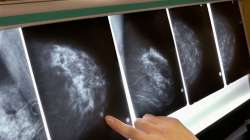AI-based model can enhance breast cancer risk prediction
A sophisticated type of artificial intelligence (AI) can outperform existing models at predicting which women are at future risk of breast cancer, according to researchers

A sophisticated type of artificial intelligence (AI) can outperform existing models at predicting which women are at future risk of breast cancer, according to researchers. High breast density, or a greater amount of glandular and connective tissue compared to fat, is considered a risk factor for cancer.While density may be incorporated into risk assessment, current prediction models may fail to fully take advantage of all the rich information found in mammograms. This information has the potential to identify women who would benefit from additional screening with MRI.
Karin Dembrower, breast radiologist from the Karolinska Institute in Stockholm, Sweden and colleagues developed a risk model that relies on a deep neural network, a type of AI that can extract vast amounts of information from mammographic images.
The deep neural network showed a higher risk association for breast cancer compared to the best mammographic density model.
The false negative rate -- the rate at which women who were not categorized as high-risk were later diagnosed with breast cancer -- was lower for the deep neural network than for the best mammographic density model.
"Risk prediction is an important building block of an individually adapted screening policy," said Dembrower in a study published in the journal Radiology.
"Effective risk prediction can improve attendance and confidence in screening programmes".
"The deep neural network overall was better than density-based models," Dembrower said.
The study findings support a future role for AI in breast cancer risk assessment.
As an additional benefit, the AI approach can continually be improved with exposure to more high-quality data sets